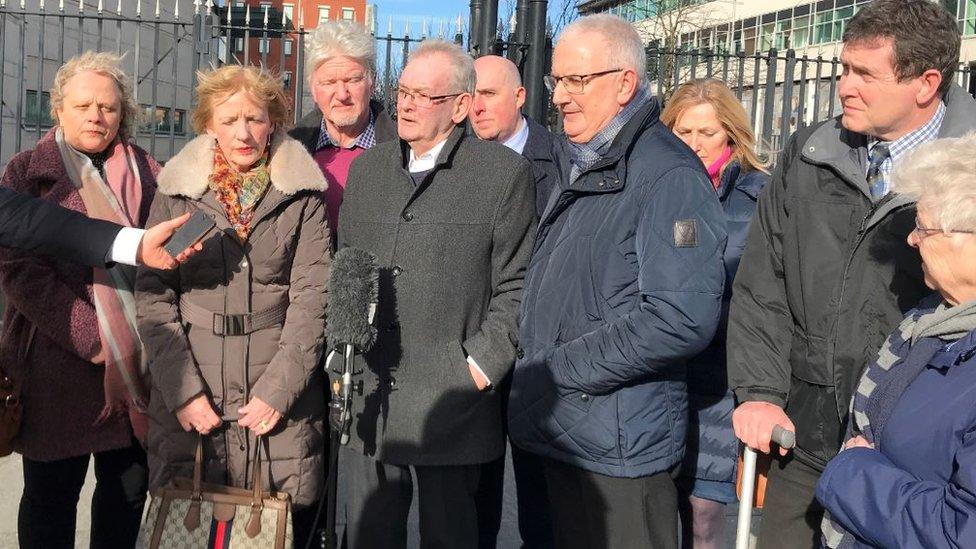Kingsmills massacre a sectarian IRA attack - inquest
- Published
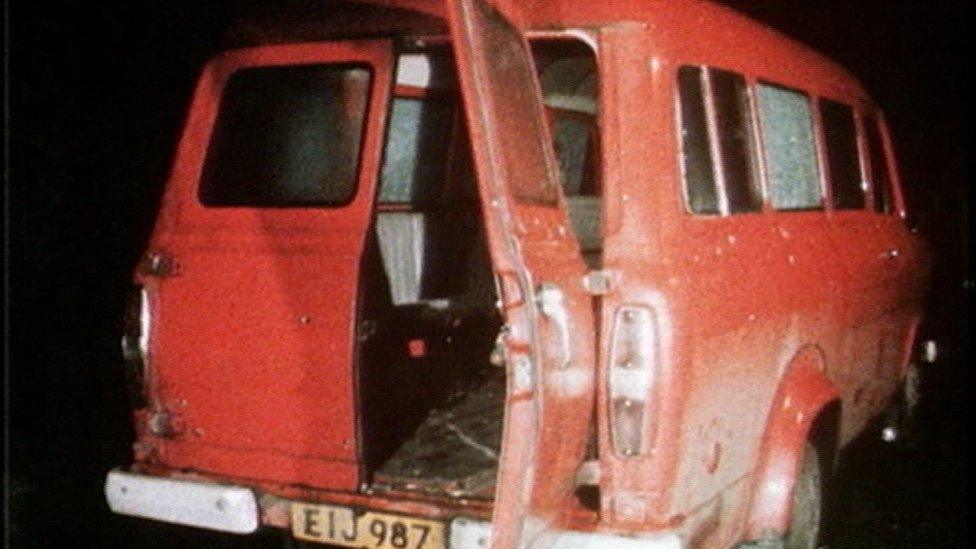
The men were ordered from this van and shot
The killing of 10 men in County Armagh in 1976 was an overtly sectarian attack mounted by the IRA, an inquest has found.
Ten Protestant workmen were shot dead when a gang ambushed their minibus near Kingsmills on 5 January 1976.
The gunmen stopped their van and asked which among them was a Catholic, and instructed that man to leave the scene. The rest of the men were shot.
Their families have called for an public inquiry.
In response, a government spokesperson said the families had their "deepest sympathies" and hoped the findings gave them "some comfort".
No-one has ever been held to account for the murders.
The coroner, Judge Sherrard said that the inquest found that it was carried out by a unit consisting of at least 12 members of the IRA, pretending to be an army patrol.
Throughout the Troubles, loyalist and republican paramilitaries carried out tit-for-tat murders, killing people simply based on their religion.
'Planned well in advance'
Shortly after the attack the so-called South Armagh Republican Action Force claimed responsibility for it.
The coroner said that was a lie.
"The attack was carried out by the IRA operating under the authority of the Army Council which had, in April 1975, given wide authorisation to IRA units," he said.
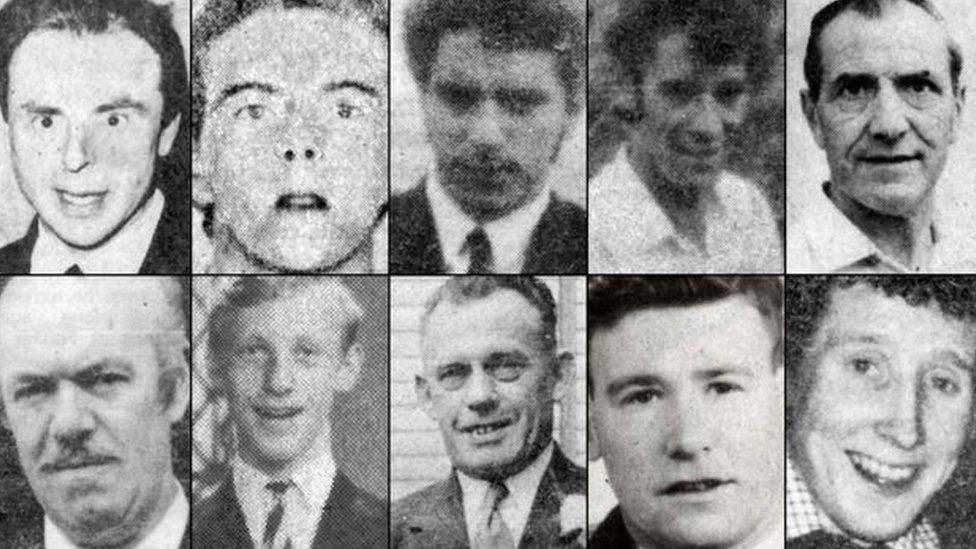
Ten workmen, aged from 19 to 58, were murdered by the IRA at Kingsmills in 1976
He said that while it was "ostensibly in direct response" to attacks on the Reavey and O'Dowd families by loyalist terrorists, it was not spontaneous but had been planned "well in advance".
He said that the IRA had failed to engage with the inquest and there had been "no acknowledgement by the IRA of the utter wrongness of the atrocity, its impact on those bereaved or the damage caused to the entire community".
"Kingsmill was an overtly sectarian attack by the IRA. It was mounted because the deceased men were Protestants and for no other reason," he said.
The IRA has never admitted involvement and was supposed to be on ceasefire at the time.
Nairac rumours 'utter fantasy'
Judge Sherrard said there is no evidence that informers were protected after the Kingsmills massacre, the coroner has said.
The inquest found that any suggested that those responsible for Kingsmills were "not subjected to criminal charges in order to protect an informant," was "entirely without foundation".
He said there was "overwhelming and impossible pressure on police due to terrorist activity in south Armagh" at the time and there was little tangible evidence available to them.
"It is unevidenced and unhelpful conspiracy theorising. There was no evidence of anyone being allowed to continue in criminal ventures in order to protect informers," he added.
He said that rumours that had arisen about Army officer Robert Nairac, partly due to the fact that one of those who brought the minibus to a stop had an English accent.
He said the absence of publicly available and reliable information about Kingsmills and Robert Nairic's whereabouts has fuelled rumours.
The coroner said that, while concerns had been raised by some close relatives at the inquest he understand they had been "largely allayed".
He said Captain Nairac was based in London at the time, "fully engaged in duties and was not in south Armagh" at the time.
"The notion that he would have been able to infiltrate the IRA is the stuff of utter fantasy," he said.
"The inquest is entirely satisfied he had no role whatsoever."
Judge Sherrard also said the inquest was satisfied that Kingsmills was, in part, organised from the Republic of Ireland.
In 2011, a report from the Historical Enquiries Team in Northern Ireland said the IRA was responsible for the attack.
It concluded that it had been a purely sectarian attack.
'Demanding a public inquiry'
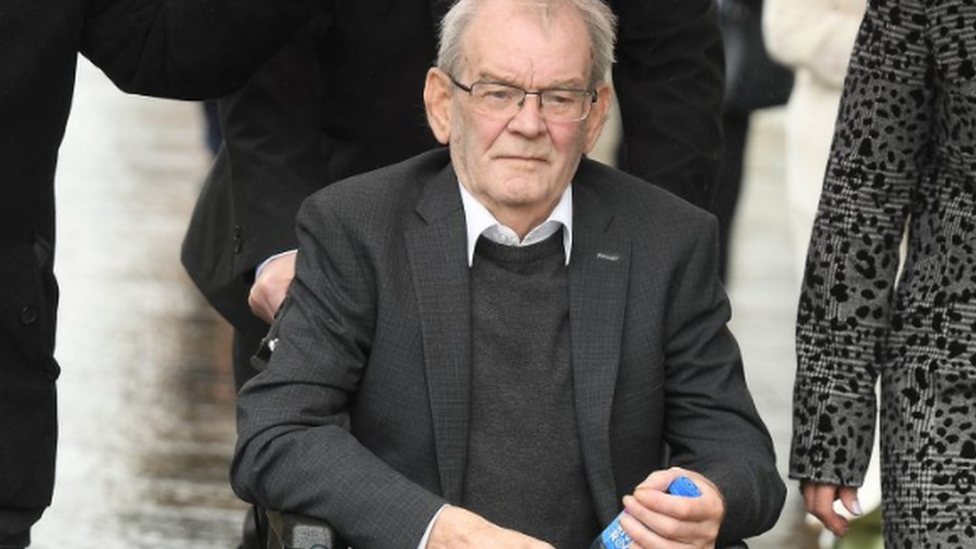
Alan Black, who survived the attack despite being shot 18 times, arrives at court
Only one man, Alan Black, survived the Kingsmills shooting, He was shot 18 times.
Outside court, he said the findings had "left us all so dissatisfied".
A joint statement from the families of John McConville and Alan Black said that when the inquest started, eight years ago they were "full of hope that the many difficult questions that have burdened us" surrounding the incident would be answered.
However the statement added: "As we progressed through the inquest our questions have not been answered and our concerns have grown."
The families said they would be demanding a public inquiry from the secretary of state.
A spokesperson for the Northern Ireland Office said in response: "We extend our deepest sympathies to the Kingsmill families.
"The coroner's findings confirm that this was a horrific terrorist atrocity, committed by the IRA, which had absolutely no justification.
"We hope the findings delivered today give some comfort to the families affected."
Karen Armstrong, whose brother John McConville was one of the victims, said she was "disappointed but not surprised that the PIRA would not participate in the inquest".
"They were not prepared or honourable enough to confront their barbaric actions in the court room," she said.
"This represents the blatant disregard they have to truth recovery. We hope that this will be noted by Sinn Féin," she said
She said it had been "a hard afternoon" listening to the inquest findings.
Backing for public inquiry
Some political parties backed the calls for an inquiry.
The Traditional Unionist Voice party said the inquest had "fallen short of any form of tangible justice", while the Ulster Unionist Party said it had "failed at every level".
Democratic Unionist Party MLA William Irwin said: "Many of the victims lost faith in this process some time ago and it will be of no comfort to them that their stance has been justified."
Sinn Féin's policing spokesman Gerry Kelly said the government should repeal the Legacy Act, which he said was "about closing the door on families ever getting truth and justice".
Former police ombudsman Baroness Nuala O'Loan told BBC Radio 4's The World Tonight programme she questioned the withholding of the perpetrators' names.
She said: "An awful lot of material is described as not being capable of being revealed because of a threat to national security and I do not think such a threat exists 48 years after an atrocity.
"The coroner has said there was no collusion or state involvement in this, so this is a question of what did the IRA do and why did they do it, and the question has to be asked - why is the state covering this up even now?"
Related topics
- Published12 April 2024
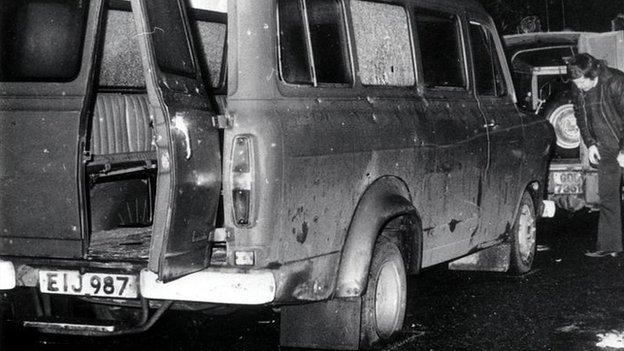
- Published12 April 2024

- Published26 February 2020
